
by Ecoziva (Brazil) | Nov 17, 2014 | 2014, Being Thankful, Brazil, Communication, Computers, Sexual Assault, Social Media, Uncategorized
 Imagine the scene: an eight year old girl with a Facebook account – allowed for by her parents. I will call her Maria. Maria’s parents both work full time and after school she stays at home with the maid. She has full access to the computer and knows how to navigate the Internet quite well.
Imagine the scene: an eight year old girl with a Facebook account – allowed for by her parents. I will call her Maria. Maria’s parents both work full time and after school she stays at home with the maid. She has full access to the computer and knows how to navigate the Internet quite well.
Several hundred kilometers away, a grown man creates a fake Facebook account using childhood photographs of a famous teenage singer. He contacts Maria and she accepts him as her online friend. They chat. At one point he says he loves going to the beach and sends her a picture of the singer, when around age eight, at the beach. “I also love going to the beach!” she says and, when prompted, sends him a picture of herself at the beach wearing a bikini.
The friendship progresses over several days. Maria is happy because she and the cute boy seem to have a lot in common. One day he asks for her phone number. He says his birthday is coming up and he wants to invite her. Using a child’s voice, he talks to her briefly and then asks if she can talk to his father. The “father” says the “birthday” will be a lot of fun: he will pick her up at school and take them to the mall, to the movies, for ice cream and other fun things.
He also tells her not to worry about talking to her parents. He will call them later and they will work everything out.
The day of the “birthday” arrives. The man gets to Maria’s school and tells the porter he is her uncle. The porter says he will have to call Maria’s parents to get permission for her to go with him. “No problem,” he says, “while you call I will go pick her up in her classroom”. Her parents deny the story and the man is not able to leave the school grounds with Maria. At this point the school staff has started to get suspicious and they are able to record the number of his license plate and inform the police.
The man is later intercepted at the state border. He has a criminal record and has already spent time in prison for molesting children. Unfortunately, as there was no formal accusation, the police are not able to arrest him.
The scary situation I described above is a true story that happened to the daughter of one of my husband’s colleagues. The topic came up in a talk how nowadays children are so computer savvy, and my husband commented on how we limit the kids’ screen time: we have no TV set at home; the eldest has limited time on the Internet and no social media or e-mail accounts; and, more recently, we have cut all screen time for the two smaller kids (both under four) with the exception of days at grandma’s and the rare trip to the movie theater. At that point the co-worker stated that nowadays it is impossible to control kids’ screen time and recounted what happened to his girl.
Valdemar Setzer*, a professor at the Computer Science Department of the University of São Paulo (USP) researches the impacts of screens on children and advocates that kids – for lack of maturity – should have no access whatsoever to the Internet (teens included). I recently heard him talk and a lot of what he said only confirmed my own opinions and reinforced the hard decision of eliminating all screen time for my two youngest kids at home.
On the other hand, it also got me thinking about how part of the problem doesn’t have to do with the screens themselves: it is much more about parents and children who spend way too little (quantity) time together, parents who overwork to make ends meet and are (understandably) too tired to play or do outdoor activities with the kids and the end of the day or during the weekends, or simply parents and kids which communication needs to improve a lot.
I am not trying to be judgmental here – I am grateful my job is flexible and allows me to have a lot of time with my kids, but I know other parents are not so fortunate.
However, even in my case stories like this make me once again rethink my priorities and find ways to organize our family life, as there is always room for improvement. After all, there is nothing more important to me that my children, and I believe that is the case for most parents. Also, despite all the benefits the Internet and other new means of communication have brought about (such as bringing together mothers from around the world in this blog!), for me real, active life is always better than the passive life that goes on “behind the screens” – not only for children, but for adults too!
And you, do you control your children’s screen time? If so, how? Please share your story!
[*] Prof. Setzer’s website is loaded with information on the effects of screens on children, including stuff in English – http://www.ime.usp.br/~vwsetzer/
This is an original post to World Moms Blog by Eco Ziva of Brazil. Photo credit: Sinistra Ecologia Libertá. This picture has a creative commons attribution license.
Eco, from the greek oikos means home; Ziva has many meanings and roots, including Hebrew (brilliance, light), Slovenian (goddess of life) and Sanskrit (blessing). In Brazil, where EcoZiva has lived for most of her life, giving birth is often termed “giving the light”; thus, she thought, a mother is “home to light” during the nine months of pregnancy, and so the penname EcoZiva came to be for World Moms Blog.
Born in the USA in a multi-ethnic extended family, EcoZiva is married and the mother of two boys (aged 12 and three) and a five-year-old girl and a three yearboy. She is trained as a biologist and presently an university researcher/professor, but also a volunteer at the local environmental movement.
More Posts

by World Moms Blog | Sep 23, 2014 | 2014, ONE, Save The Children, Social Good, Social Media, World Moms Blog, World Voice
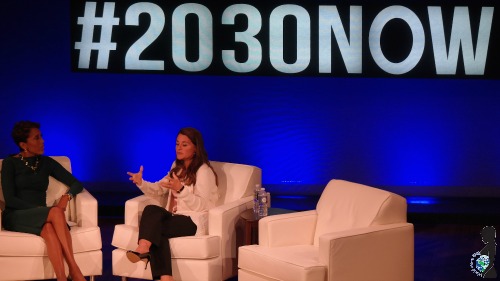
Melinda Gates being interviewed at the Social Good Summit in New York City on September 22, 2014.
“The Social Good Summit is the Grassroots equivalent of the UN General Assembly” – NY Times Journalist and author, Nicholas Kristof
Five editors from World Moms Blog attended the Social Good Summit in New York City this past weekend. So, what’s the best way to get a wrap-up of the event? We asked them all to tell us their highlights from the weekend. Here’s what they had to say…
Kyla P’an of “Growing Muses” and WMB Managing Editor responds,
Since I started writing and editing for World Moms Blog four years ago, I’ve been hearing about the Social Good Summit. Since the first time WMB founder, Jen Burden, attended — outfitted with baby sling and infant–back in 2011, I’ve been curious. Curious about the format, curious about the attendees, curious about the messaging. Today, I assuaged that curiosity by attending day two of the two-day summit. In concert with the United Nations General Assembly (UNGA to industries insiders), the Summit pulls together journalists, bloggers, foreign press, grass-roots activists and social entrepreneurs.
Together with fellow Sr. Editors, Elizabeth Atalay, Nicole Melancon and our tireless founder, Jen burden, we attended social enterprise boot camps, UN Foundation Fellows workshops, panel discussions and keynote addresses, interviews with philanthropists and entrepreneurs. The day was a series of sound bites. Presenters spoke for as little as five minutes or as long as 37. The topic and hashtag was 2030 Now but why that was chosen remains a bit of a mystery to me. And though I did not walk away from the actual summit feeling changed, I didn’t walk away unaltered.
Here are my three highlights: Robin Roberts interview with Melinda Gates; the Ugandan rappers Weasel and Radio who performed at the Every Woman, Every Child reception; and the exclusive briefing with Save the Children, the ONE Campaign, the Gates Foundation and actor Idris Elba. So would I drive eight hours round trip for 24-hours of Social Good again? In a heartbeat!
Jennifer Burden, Founder & CEO of World Moms Blog, says,
1. The Social Media Fellows lunch with Adepeju Jaiyeoba, a human rights lawyer and activist from Nigeria. Adepeju founded motherskit.org, which has distributed over 7,000 birth kits to mothers in Nigeria. Her passion for rocketing my interest in advocating for the health of women was contagious, tearful and inspiring all at the same time. And, yes, I know what you are thinking — we immediately connected her to World Moms Blog contributor, Kirsten Zalota of Cleanbirth.org, who distributes birth kits in Laos. They are planning a Skype chat already!
2. I found the conversations that came up in our Social Media Fellows session with MAMA on the topic of family planning important and sad. My wish is that more woman can have control over when they have babies and how many they have, which leads me to my only regret about the Summit — not being able to stay later in the evening for the Engender Health event, which launched the “WTFP?!” campaign, meaning, “Where’s the Family Planning?”. Engender Health has been working for decades towards maternal health and family planning, and this campaign focuses on women’s health in the developing world. I hope to hear more about their work on family planning in the future!
3. Seeing the Summit for the first time this year through the eyes of World Moms, Kyla P’an and Sarah Hughes. Kyla has been integral to the editing of our site for years, and I am thankful she joined us in NYC to experience the global conversations we both, report on and contribute to. Sarah, also new to the event, has been a social media editor at World Moms Blog. She covered the Summit on Sunday on our World Moms Blog Facebook page, and I can sum up her enthusiasm in a picture:
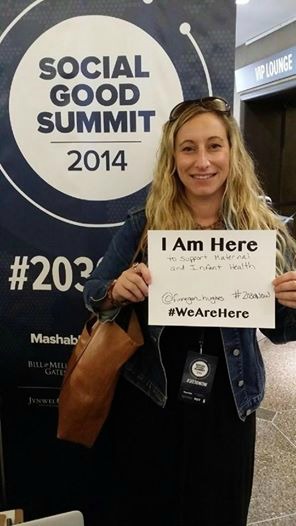
Awwwww! Go, Sarah, go!
World Voice editors, Elizabeth Atalay and Nicole Melancon, seasoned Social Good Summit attendees, were (as always!) active and important parts of global conversation!
Sarah Hughes of “Finnegan and the Hughes” and WMB Social Media Editor, writes:
I loved everything about Social Good Summit!! The air was filled with excitement and possibility. The overall vibe of changing the world was apparent and obvious. Here are my top three highlights from the event!:
1. Meeting Susan Can, Director of Corporate Equity in the Global Marketing for Johnson & Johnson. Susan and I had breakfast together and chatted about the importance of maternal health. We chatted about J&J mobile health iniative Text4Baby and how it is helping underserved mothers in the US.
2. Listening to Graca Machel telling us we must NOT leave any woman behind!! Hearing her speak with such authority and assertiveness in her tone really left me feeling like we CAN do this and we MUST!
3. I left feeling sad after the session on maternal and infant health and how far off we are on reaching MDG 4 and MDG5. My passion is maternal and infant health and it just seems like we are failing our world mothers by not doing better. Yes, some are trying but it’s just not enough and I want to know how to do more and WHAT to do!
Elizabeth Atalay of “Documama” and WMB Senior Editor, writes:
I had to stop and think when a friend asked what it was about the Social Good Summit that I loved so much. “Was it the connections, the panels, or the events surrounding it?”, she wondered. I decided that most of all it was the culture of the event, where the room is full of innovators and change makers that I find so inspiring.
The Social Good Summit makes me feel like I have a finger on the pulse of the Social Good movement.
I confess to at times being torn between socializing with all of the amazing people there doing cool things, sitting in the auditorium taking notes and hanging on every word of the amazing speakers in the line up, or catching sound bites, and photo ops in the media lounge. It is always refreshing to spend the couple of days with like minded global optimists as passionate as I am about making a difference in the world.
My highlights this year were:
1. Attending the Every Woman Every Child #MDG456Live event where we ran into our friend Phil Carroll from Save the Children, danced to Ugandan pop stars and then got to catch up with other World Moms and friends at an amazing South African restaurant.
2. Sitting in with the Social Good Fellows and Shot@Life director Devi Thomas to learn about another UN Foundation initiative the Mobile Alliance for Maternal Action referred to as MAMA.
3. Listening to my hero Melinda Gates talk about her plans for putting women and girls on the forefront of the global agenda and just being in close proximity to her greatness.
4. Getting a debriefing at a round table discussion with ONE, Save The Children and the Gates Foundation on the Ebola crisis from Actor Idris Elba, President of Save The Children Carolyn Miles, Jamie Drummond co-founder of ONE, and Dr. Chris Elias President of global Development for the Gates Foundation. Discussing the “Trillion Dollar Scandal” report on transparency, and the continuing Syrian refugee crisis.
As always I leave the Social Good Summit completely inspired and at the same time a bit overwhelmed with information. Amazing, powerful, and hopeful information.
Nicole Melancon of Thirdeyemom and WMB Editor says: This was my third year attending the Social Good Summit and each year it gets better and better. After two, highly intense and emotionally charged days I walk away inspired to use my voice to promote good and help change the world. For me, the key highlights were the fact that we are fortunate to live in a world where we have a voice so let’s use it. Let’s engage in the issues that mean the most to use, and use our voice to disrupt the system and ignite change. So many people around the world do not have this power and freedom to use their voice and now it is more important than ever to be heard. Where do we want to be in 2030 is up to us. So what kind of world do we want? It is up to us.
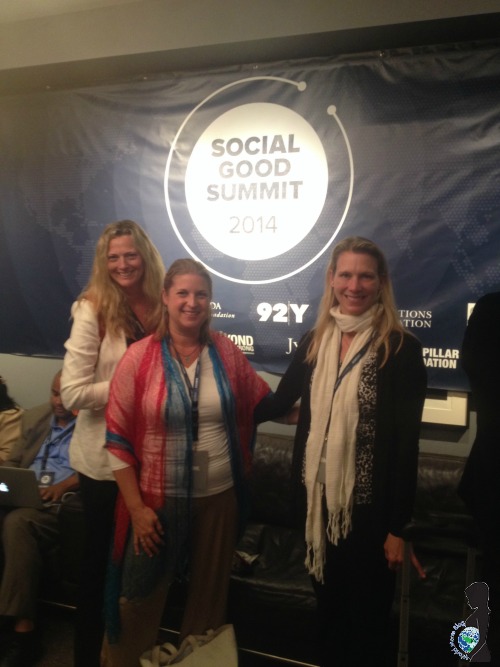
World Moms, Elizabeth Atalay, Kyla P’an and Nicole Melancon at the Social Good Summit in NYC.
World Moms Blog is an award winning website which writes from over 30 countries on the topics of motherhood, culture, human rights and social good. Over 70 international contributors share their stories from around the globe, bonded by the common thread of motherhood and wanting a better world for their children.
World Moms Blog was listed by Forbes Woman as one of the "Best 100 Websites for Women 2012 & 2013" and also called a "must read" by the NY Times Motherlode in 2013. Our Senior Editor in India, Purnima Ramakrishnan, was awarded the BlogHer International Activist Award in 2013.
More Posts

by Jennifer Burden | Aug 5, 2014 | 2014, Awareness, Education, Humanitarian, Older Children, Save The Children, Social Good, Social Media, World Moms Blog, World Voice, Younger Children

World Moms Blog is thrilled to be taking part in Save the Children‘s #FindTheWords campaign. The campaign raises awareness over 30 days with 30 words to emphasize that every child needs early education to thrive. The community of mothers that form World Moms Blog are committed to improving not just the lives of our own children, but of all children around the world.
Just by helping us spread the word by sharing on social media you will be entered to win a $100.00 gift card!
CREATE
The inspiration word we were given by Save the Children for this post was “create.”
We believe in creating the world we want to live in, here, at World Moms Blog. When I was looking to find a one-stop-place to read about mothers in different cultures and countries back in 2010, I couldn’t find what I was looking for. So on a whim, I decided to create the site I wanted to follow, just for fun.
In turn, the web site led me to new corners of the globe for social good and to meet my fellow World Moms, raised awareness for global health programs for women and children, created various international journalistic opportunities and fellowships for our contributors, and connected many very different women whom, otherwise, may have never connected, but are so glad they did!
Today, World Moms Blog writes from over twenty different countries spanning the globe, yet, we’ve found that mothers from such diverse places all want the same things for their children: health, peace, education, and security. We all want to see our children thrive and grow to their full potential.
There is an incredible sense of pride in creating something, whether you are a child creating a “masterpiece” or a mom creating the family financial plan. In creating World Moms Blog, I have had the opportunity to see many of our contributors run wild with their passions across our pages and witness our editors build our behind-the-scenes in managing over 60 volunteer contributors. That’s creation gone wild, and I love it!
With the help of the women who were part of writing and/or later embraced our mission statement, our site has blossommed into a tight-knit, albeit, world-wide community where the contributors and readers alike are able to broaden their worlds and connect over continents…all through the conduit of motherhood.
The word create inspires all we stand for at World Moms Blog. Whether it is to create an opportunity for yourself or for others to thrive globally, to create the life you want to lead, or the world you want to live in.
And we admire the work of Save The Children in creating a safe, healthy space for the children who need it most. Kids are at our heartstrings! Here are some amazing facts about the challenges children face around the globe:
- The first years of life are critical in children’s development, shaping cognitive, social and language skills, as well as lifelong approaches to learning. Evidence shows that 85 percent of brain growth occurs in the first five years of life.
- By age three, children from low-income homes hear on average 30 million fewer words than their peers, putting them 18 months cognitively behind his or her peers when they start school.
- 65% of young kids in need have little or no access to books. More than two-thirds of poverty-stricken households do not possess a single book developmentally appropriate for a child under five.
- Parents who talk less with their children in an engaging and supportive way have kids who are less likely to develop their full intellectual potential than kids who hear a significant amount of child-directed speech.
- Around the world, if all students in low-income countries acquire basic reading skills, 171 million people could be lifted out of poverty.
Help create the future we want for children with Save the Children’s #FindTheWords. Early education creates an environment for young minds to flourish all over the world.
Just by helping us spread the word by sharing on social media you will be entered to win a $100.00 gift card, here are the rules:
To enter share our post via twitter or Facebook or Snap a picture anywhere you see the word “Create” out in the world (or what it means to you) then post it to Facebook, Twitter, or Instagram.
To officially participate, your contributions must be tagged with the proper hashtags
#FindTheWords
#Create
and don’t forget to tag @WorldMomsBlog so we know you are in the running to win!
(The more people who share our posts the better chance we have of winning an interview with actress Jennifer Garner! So what are you waiting for!?)
a Rafflecopter giveaway
This is an original post to World Moms Blog by founder, Jennifer Burden.

Jennifer Burden is the Founder and CEO of World Moms Network, an award winning website on global motherhood, culture, human rights and social good. World Moms Network writes from over 30 countries, has over 70 contributors and was listed by Forbes as one of the “Best 100 Websites for Women”, named a “must read” by The New York Times, and was recommended by The Times of India.
She was also invited to Uganda to view UNICEF’s family health programs with Shot@Life and was previously named a “Global Influencer Fellow” and “Social Media Fellow” by the UN Foundation. Jennifer was invited to the White House twice, including as a nominated "Changemaker" for the State of the World Women Summit. She also participated in the One Campaign’s first AYA Summit on the topic of women and girl empowerment and organized and spoke on an international panel at the World Bank in Washington, DC on the importance of a universal education for all girls. Her writing has been featured by Baby Center, Huffington Post, ONE.org, the UN Foundation’s Shot@Life, and The Gates Foundation’s “Impatient Optimists.” She is currently a candidate in Columbia University's School of International and Public Affairs in the Executive Masters of Public Affairs program, where she hopes to further her study of global policies affecting women and girls.
Jennifer can be found on Twitter @JenniferBurden.
More Posts - Website
Follow Me:


by World Moms Blog | May 20, 2014 | 2014, Awareness, Girls, Government, Human Rights, Humanitarian, International, Social Good, Social Media, World Moms Blog

As a mother, it is really hard to see other mothers go through certain challenges. I think it’s in me to be supportive in whichever way that I can when there is something I can do about a situation….like the hundreds of Nigerian schoolgirls who have been kidnapped; I marched to show my support on Mother’s Day.
Every mother’s dream is to see her children have the best in life, which includes education. A famous quote by renowned Ghanaian educationist Dr James Kwegir-Aggrey is:
“if you educate a man you educate an individual, but if you educate a woman you educate a whole nation”
This describes the power of educating young girls. It is every girl’s right and boys too to have an education but when these dreams are shattered it becomes a concern to all. Everyone knows the power of education, and it is evident that when a child is educated, he or she is set on the path to greatness.
‘Education is the most powerful weapon which you can use to change the world’- Nelson Mandela.
Taking these girls away from school is like taking them away from their paths to greatness. We hope and pray that they are returned safely to their families. This is why mothers of Ghana joined the campaign to #BringBackOurGirls on this past Mother’s Day in Accra. It was a solidarity march to present a petition to the Nigerian high commissioner in Ghana organised by Yasmeen. A mother herself, she is a songstress with a golden voice and a concerned citizen of our continent Africa. You can listen to her here .
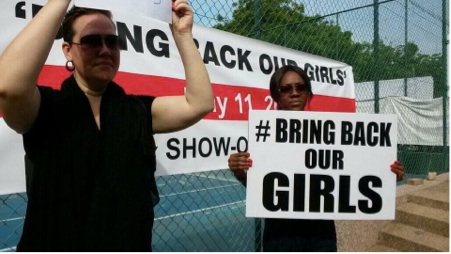
Mother’s Day is no fun if you know that another mother is grieving over her lost child. This was a great initiative by a group who care to march in solidarity in support of the kidnapped Nigerian school girls of Chibok. I saw the post on twitter and immediately wanted to be a part of this great cause. Thank you Yasmin for organising this!
It was an experience for both the young and the old as the children and babies were not left out. There were placards for everyone with ‘Bring Back Our Girls’ boldly inscribed on them. The media was present to cover the event, and the police were also there to ensure the safety of all who came for the walk.
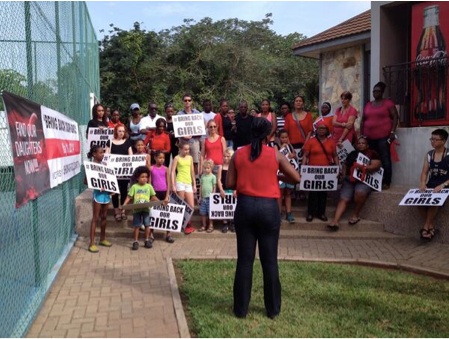
Almost everyone who came wore black and red to signify solemnity. Signatures were also appended on a banner which was later presented to the high commissioner. The walk was through some parts of the capital city of Ghana to the Nigerian High commissioner’s residence. It was such a solemn march and the support was so immense. As mothers everywhere are celebrated this month, let us not forget the ones who are heartbroken over their missing girls.
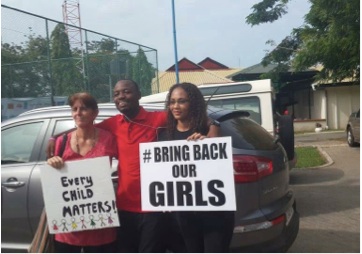
My heart aches each time I think of these girls or see a post about #BringBackOurGirls. We will not relent but continue to pray for the safety of the girls, their families and especially their mothers!
This is an original post written by Adwoa Gyimah of Ghana for World Moms Blog. Photo credits: Adwoa Gyimah
What more can we do to #BringBackOurGirls !?
World Moms Blog is an award winning website which writes from over 30 countries on the topics of motherhood, culture, human rights and social good. Over 70 international contributors share their stories from around the globe, bonded by the common thread of motherhood and wanting a better world for their children.
World Moms Blog was listed by Forbes Woman as one of the "Best 100 Websites for Women 2012 & 2013" and also called a "must read" by the NY Times Motherlode in 2013. Our Senior Editor in India, Purnima Ramakrishnan, was awarded the BlogHer International Activist Award in 2013.
More Posts

by World Moms Blog | May 10, 2014 | 2014, Education, Girls, Government, Human Rights, Humanitarian, International, Nigeria, School, Social Equality, Social Good, Social Media, Women's Rights, World Moms Blog
Abducted. Scared. Abused.
Sold.
That’s the likely fate 276 girls are facing, taken from their schools in the remote reaches of north-eastern Nigeria by the terrorist group Boko Haram. It’s been over three weeks since this started. We don’t what’s happening to them and we all fear the worst.
We’re sickened. We’re outraged. We also have no idea what to do. So, we’re doing what Americans tend to do. We’re taking selfies of ourselves with the #BringBackOurGirls hashtag. We’re tweeting. We’re posting facebook rants. In the lack of anything else to do, we’re signing online petitions by the thousands to make the world pay attention.

I’m not saying this these are bad actions to take. No! I signed the petition myself. I tweeted #BringBackOurGirls. I liked and shared Amy Poehler’s Smart Girl posts on facebook to help focus the national conversation on them. I was thrilled to hear that the U.S. is sending support and I believe social media was a part of that. But after I did those things, I was still sickened. Still outraged. I still didn’t know what to do.
And then I thought of this girl.

Malala Yousafzai. A Pakistani girl shot in the head by the Taliban at the age of 15 who still fights daily for girls’ education knows a little something about this issue, don’t you think? She has said, “The extremists are afraid of books and pens, the power of education frightens them. They are afraid of women.”
Then, let those men be afraid of me. I am even more dangerous than a schoolgirl with a pen. I’m an educated mother with a laptop. And I’m not just coming after them. I’m coming after their whole oppressive way of life.
The welfare of the kidnapped girls rests in someone else’s hands in the short term, but I advocate against poverty and injustice with an eye for the long term. While we wait and we pray for these girls, shouldn’t we be using this anger and anguish to secure a future for all girls coming after them?
If all children were in school as a normal matter of course, then schools with girls would cease to be obvious targets. That fundamental paradigm shift would be more effective than sending a SEAL Team in to get the girls (even though that is what I dearly want to happen right now) because educated and empowered girls become mothers who raise enlightened sons.
Here’s another Malala quote:
“Our men think earning money and ordering around others is where power lies. They don’t think power is in the hands of the woman who takes care of everyone all day long, and gives birth to their children.” But the men are wrong. Indeed, the hand that rocks the cradle rules the world.
So, what concrete actions can we – as Americans – take right now to hasten this reality? We can start by demanding that our U.S. Representatives pass the Education for All Act (H.R. 2780), which specifically calls out victims of human trafficking as some of the most vulnerable children to help. We can also call on them to sign U.S. Representative Jan Schakowksy’s letter to the Obama administration to fund $250 million over 2 years to the Global Partnership for Education, which aims to raise $3.5 billion from donor governments at a pledging conference this June. With $3.5 billion invested by donors, the Global Partnership can secure an additional $16 billion from developing country governments. By 2018, that investment can support quality education for 29 million children, largely in fragile and conflict-affected states.
As badly as we need the #BringBackOurGirls social media awareness today for the 276 girls we keep vigil for, these two steps are even more needed in the long run to help millions of other girls at risk now and in the future.
So, after you’ve tweeted and posted your selfie on facebook, do not stop there. Click on these links to contact your U.S. Representative about the Education for All Act and the Global Parntership for Education. Tell them that girls are showing incredible courage just to go to school, and the U.S. should support them. Educating all girls and boys will create a world where kidnapping and selling students is not acceptable in any culture on the planet.
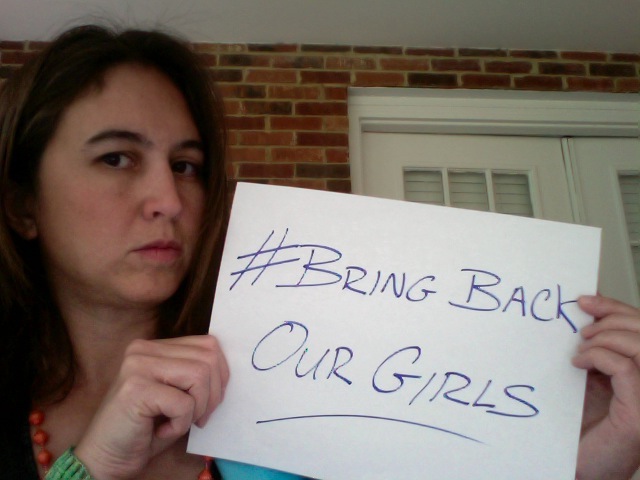
This is an original Post for World Moms Blog by Post by Cindy Changyit Levin who writes the Anti-Poverty Mom blog and is volunteer advocate for RESULTS, Shot@Life and the ONE Campaign. She can also be found on twitter @ccylevin.
Are you ready to take action?
World Moms Blog is an award winning website which writes from over 30 countries on the topics of motherhood, culture, human rights and social good. Over 70 international contributors share their stories from around the globe, bonded by the common thread of motherhood and wanting a better world for their children.
World Moms Blog was listed by Forbes Woman as one of the "Best 100 Websites for Women 2012 & 2013" and also called a "must read" by the NY Times Motherlode in 2013. Our Senior Editor in India, Purnima Ramakrishnan, was awarded the BlogHer International Activist Award in 2013.
More Posts

by Mannahattamamma (UAE) | Mar 19, 2014 | 2014, Computers, Cultural Differences, Culture, Education, Expat Life, Government, Homeschooling, Living Abroad, Multicultural, Older Children, Politics, Religion, School, Social Media, Traditions, UAE, USA
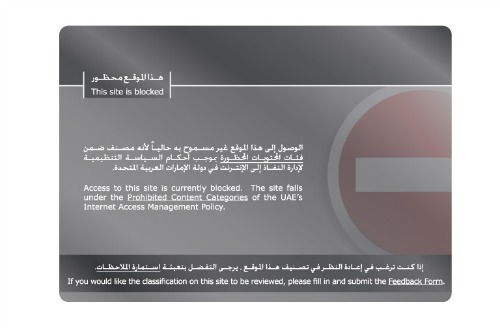 I always swore I would never home-school my children. I know many people do, and do it quite successfully, but I’m awfully fond of the quiet that descends on my house after they’ve tromped off to school. If that tromping were only happening from the bedroom to, say, the kitchen table, I think I might simply lock myself in the bathroom and never come out.
I always swore I would never home-school my children. I know many people do, and do it quite successfully, but I’m awfully fond of the quiet that descends on my house after they’ve tromped off to school. If that tromping were only happening from the bedroom to, say, the kitchen table, I think I might simply lock myself in the bathroom and never come out.
But as so often happens, my vow has collided with reality and I have found myself, in recent weeks, trolling home-schooling websites in search of teaching resources. My kids are now 9 (nine and a half, he would say indignantly) and 13; they go to a British school here in Abu Dhabi. That means they’ve spent a lot of time learning various English kings and queens, although they can’t recite them all in order. They study “maths,” and do prep rather than homework; they study English history and geography; they read mostly English writers in their literature classes. In addition to all those Anglo studies, they take Arabic language classes four days a week and once-weekly class called “Islamic Studies.” The Arabic classes are mandated by ADEC (Abu Dhabi Education Council) and I have to say, I’m much more interested in my kids learning Arabic than I am in their ability to name all the English kings and queens.
Having the boys be in an English system has been a learning curve for all of us. We’re learning two languages, actually, Arabic and, well, English: the boys now live in a world where things are “grey,” luggage goes in the “boot,” and we put garbage in the “bin.”
I’m not considering a dabble in the home-schooling system in order to beef up my boys’ appreciation of the Queen’s English, however. My kids, like every schoolchild in the country, have a curriculum that is at least in part determined by the UAE government, and that means there are things that aren’t supposed to be taught. I live in a place where censorship happens and where, unlike the States, the policies cannot be overtly challenged in the courts. So, for instance, in the States if you live in a town where they want to ban the Harry Potter books, you can take the school district to court. Not here.
We had to sign a permission slip so that our older son could get the science textbook that included the chapter on reproduction (with pictures of, you know, the embarrassing bits); his Latin class translates vinum as … grape, not wine. These are relatively small annoyances, although of course they are far from ideal.
There are, however, more serious concerns in terms of what shouldn’t be included in history courses and literature courses, and that’s where I find myself trolling the home-schooling sites for resources. The Holocaust can’t be taught here; Israel and Judaism are not supposed to be mentioned here; communism isn’t supposed to be discussed; evolution isn’t supposed to be taught; and the list goes on. Sometimes it feels as if we’re living in some kind of Bible-thumping town in the rural U.S and I realize, yet again, that fundamentalism can be seen as a global phenomenon that differs only in the nature of its prohibitions: the fear that motivates the prohibitions stays constant.
Before you leap to any conclusions, please know that the Muslim families I know are as frustrated by these government-issued edicts as are the non-Muslim families and many of us have talked together about what we can do to help our children gain a full picture of the world, regardless of what the government says. So it is that what in some contexts (living in Manhattan, for instance) would be a purely theoretical discussion has become in our household, a very pragmatic series of conversations.
Think about it: how would you talk to your kids about censorship? Is censorship always bad? Think about your children, if you have them, and the internet: are there sites you say they can’t see, or have you put a filter or something on your computer to prevent certain kinds of access? Do we agree that there is such a thing as “good” censorship? (Because of that whole teenage-boy-surfing-the-internet thing, I see a (slight) upside to living in a “nanny state.” I am fairly sure that if he wanted to look, my son wouldn’t be able to find basic porn–not to say that if he really wanted to dig around he couldn’t elude the censors, but at this point, I think his porn-directed vocabulary is still too limited to get around the government blocks. I guess we file that under “thank goodness for small favors,” right? )
My husband and I are both professors, and so we are able to bolster and supplement what isn’t happening in school, but we are also having a lot of conversations with our kids about censorship, politics, and the necessity of thinking about things in ways that are different from how we might think about them. We point out that the UAE isn’t Saudi Arabia; there is no Taliban here; the country is not governed by a theocracy of any sort. We know Jewish families who live here; I know gay couples who live here; a Mormon family lives next door to us. I see people on the beach in the scantiest of scanty bathing suits.
Living here means coming to term with nuance, with ambiguity, with living in a world that is organized around “both/and,” rather than “either/or.” The country is progressive and conservative; censorship is a problem that has a context; learning happens as much from what is not there as it does from what is there. It’s complicated and let’s be honest — no nine year old, no thirteen year old—and very few adults—really likes ambiguity. After all, if there is no “in-between” answer, life becomes much easier, doesn’t it?
No, of course I’m not happy that my kids have a biology textbook with the word “pig” marked out. Of course, I’m also not pleased that the Anglo-centric curriculum also neglects things like the US Civil War, other than in the most general sense. But I will say that I think it is, and will continue to be, a powerful learning experience for my children (and us) to have to confront and think about what it means to live in a place where the government attempts to exert such extensive control. I like to think that, paradoxically, these attempts at censorship will make my children more open-minded adults.
Have you ever been confronted with censorship? How have you dealt with it?
After twenty-plus years in Manhattan, Deborah Quinn and her family moved to Abu Dhabi (in the United Arab Emirates), where she spends a great deal of time driving her sons back and forth to soccer practice. She writes about travel, politics, feminism, education, and the absurdities of living in a place where temperatures regularly go above 110F.
Deborah can also be found on her blog, Mannahattamamma.
More Posts
Follow Me:


 Imagine the scene: an eight year old girl with a Facebook account – allowed for by her parents. I will call her Maria. Maria’s parents both work full time and after school she stays at home with the maid. She has full access to the computer and knows how to navigate the Internet quite well.
Imagine the scene: an eight year old girl with a Facebook account – allowed for by her parents. I will call her Maria. Maria’s parents both work full time and after school she stays at home with the maid. She has full access to the computer and knows how to navigate the Internet quite well.





















